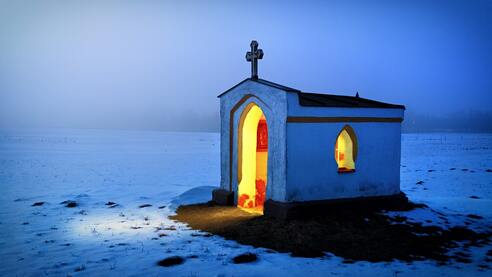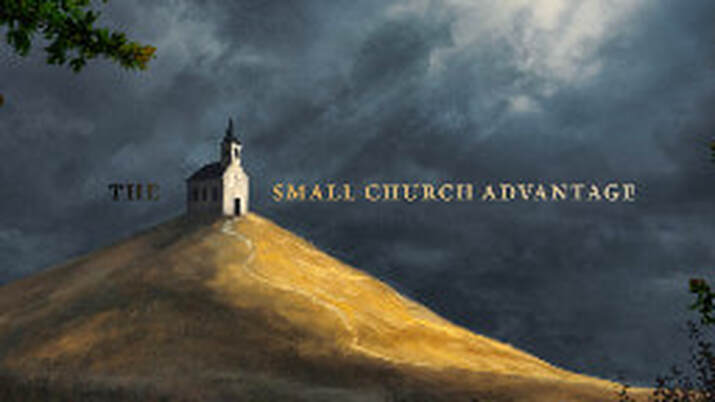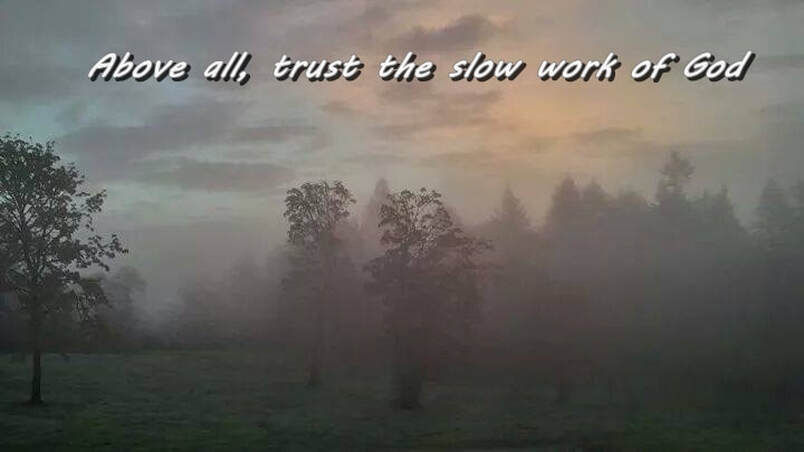The twenty-first century is the century of small, strong congregations. More people will be drawn to small, strong congregations than any other kind of congregation. Yes, there are mega-congregations; Their number is increasing greatly. Nevertheless, across the planet, the vast majority of congregations will be small and strong, and the vast majority of people will be in these congregations.
(Small, Strong Congregations, by Kennon Kallahan)
(Small, Strong Congregations, by Kennon Kallahan)
1. Begin With A Prayer
God of the past,
accept the people we have been
and the baggage we drag behind us.
God of the present,
accept the people we are now
and the potential that lies within us.
God of the future,
accept the people we could be
and by your Spirit transform us.
~ written by John Birch, and posted on Faith and Worship. http://www.faithandworship.com/
accept the people we have been
and the baggage we drag behind us.
God of the present,
accept the people we are now
and the potential that lies within us.
God of the future,
accept the people we could be
and by your Spirit transform us.
~ written by John Birch, and posted on Faith and Worship. http://www.faithandworship.com/
2. Read Part of a Short Article

Several years ago at my denomination’s annual conference, I was listening to the denominational leader give his state of the denomination talk.
As part of his assessment, he cited statistics that I had heard many times before. I’ve come to learn they are surprisingly universal across denominational lines and geographical regions.
“Over 90 percent of our churches are under 200 in weekly attendance,” he told us. “And 80 percent are under 100.”
He continued to speak, but my mind drifted as I heard this question pop into my mind. What if that’s not a problem?
What if when Jesus said “I will build my church” what He had in mind wasn’t a bunch of pastors wringing their hands because their congregation isn’t as big as someone else’s congregation?
What if Jesus’ idea was for churches of all sizes to work together, with mega, big, small, and house churches each contributing something special to the whole?
Instead, in the last generation or two, we’ve made big- and megachurches the standard, one that most churches will never reach and one, I believe, many of us aren’t supposed to reach because we’re called to be small.
There’s nothing wrong with big- and megachurches; I’m grateful for them. How can we not celebrate it when 2,000-20,000 people gather in one church to worship Jesus? That’s fantastic!
But it’s also cause for celebration when 2,000-20,000 people are worshipping Jesus across 20, 200, or more different churches in groups of 500, 200, 50, and 10. Jesus has been building His church for 2,000 years using all kinds of people, all types of methods, all styles and sizes of churches.
Great churches don't happen by mistake. No matter what size they are. They take prayer, planning, hard work, cooperation, and the calling of God. But no church can be a great church if they don’t know they can be a great church.
Too many small churches and their pastors are laboring under a false impression—a lie, really—that their church can’t be great until it becomes bigger. ...
(from: 5 Reasons Why the World Needs Your Small Church, by Karl Vaters)
As part of his assessment, he cited statistics that I had heard many times before. I’ve come to learn they are surprisingly universal across denominational lines and geographical regions.
“Over 90 percent of our churches are under 200 in weekly attendance,” he told us. “And 80 percent are under 100.”
He continued to speak, but my mind drifted as I heard this question pop into my mind. What if that’s not a problem?
What if when Jesus said “I will build my church” what He had in mind wasn’t a bunch of pastors wringing their hands because their congregation isn’t as big as someone else’s congregation?
What if Jesus’ idea was for churches of all sizes to work together, with mega, big, small, and house churches each contributing something special to the whole?
Instead, in the last generation or two, we’ve made big- and megachurches the standard, one that most churches will never reach and one, I believe, many of us aren’t supposed to reach because we’re called to be small.
There’s nothing wrong with big- and megachurches; I’m grateful for them. How can we not celebrate it when 2,000-20,000 people gather in one church to worship Jesus? That’s fantastic!
But it’s also cause for celebration when 2,000-20,000 people are worshipping Jesus across 20, 200, or more different churches in groups of 500, 200, 50, and 10. Jesus has been building His church for 2,000 years using all kinds of people, all types of methods, all styles and sizes of churches.
Great churches don't happen by mistake. No matter what size they are. They take prayer, planning, hard work, cooperation, and the calling of God. But no church can be a great church if they don’t know they can be a great church.
Too many small churches and their pastors are laboring under a false impression—a lie, really—that their church can’t be great until it becomes bigger. ...
(from: 5 Reasons Why the World Needs Your Small Church, by Karl Vaters)
3. Read a Description of "SAL"
About a year ago, the people of Salisbury United Church met together to begin the discussion about our next steps. A question was asked to guide the discussion.
"Imagine our church is a person with a unique personality
and set of character traits, blessings and challenges. How would you
describe that person today?"
You can read the notes from that description of our community of faith below. You will notice that Salisbury United Church was given the nickname "SAL". Once you have read the description of SAL you are invited to reflect and answer some questions.
(Please note that you can use the up and down arrows on the right side of the reading to move the words up and down. You can also enlarge the reading by clicking in the middle of the four arrows in the bottom right corner of the page.)
"Imagine our church is a person with a unique personality
and set of character traits, blessings and challenges. How would you
describe that person today?"
You can read the notes from that description of our community of faith below. You will notice that Salisbury United Church was given the nickname "SAL". Once you have read the description of SAL you are invited to reflect and answer some questions.
(Please note that you can use the up and down arrows on the right side of the reading to move the words up and down. You can also enlarge the reading by clicking in the middle of the four arrows in the bottom right corner of the page.)
Your browser does not support viewing this document. Click here to download the document.
4. Respond
Answer any or all of the questions below, then click "submit".
5. Read A Closing Blessing
Above all, trust in the slow work of God.
We are quite naturally impatient in everything to reach the end without delay.
We should like to skip the intermediate stages.
We are impatient of being on the way to something unknown, something new.
And yet it is the law of all progress
that it is made by passing through some stages of instability--
and that it may take a very long time.
And so I think it is with you;
your ideas mature gradually—let them grow,
let them shape themselves, without undue haste.
Don’t try to force them on,
as though you could be today what time
(that is to say, grace and circumstances acting on your own good will)
will make of you tomorrow.
Only God could say what this new spirit
gradually forming within you will be.
Give Our Lord the benefit of believing
that his hand is leading you,
and accept the anxiety of feeling yourself
in suspense and incomplete.
—Pierre Teilhard de Chardin, SJ
excerpted from Hearts on Fire
6. Something Else to Ponder: 3 Reasons It's Better to Be a Smaller Church
(click on the image below)
Find us
We are located on the corner of Broadmoor and Mission
in Sherwood Park, Alberta. |
|



